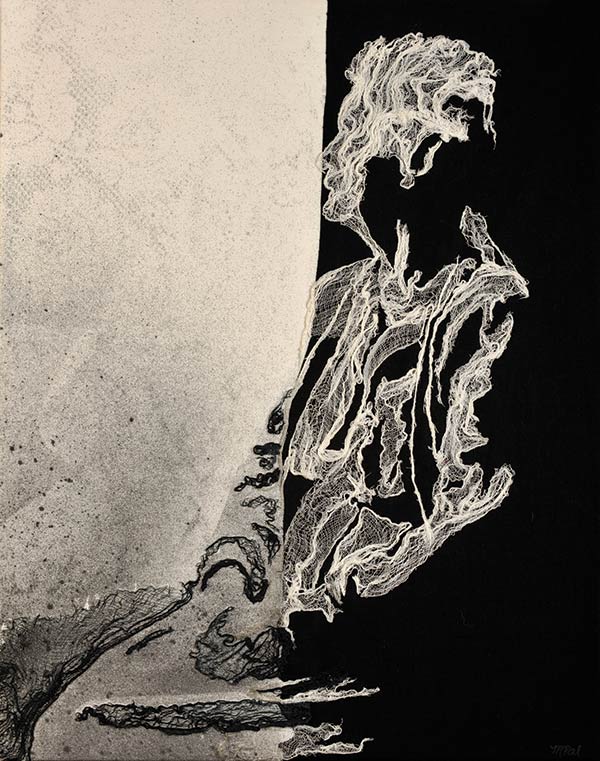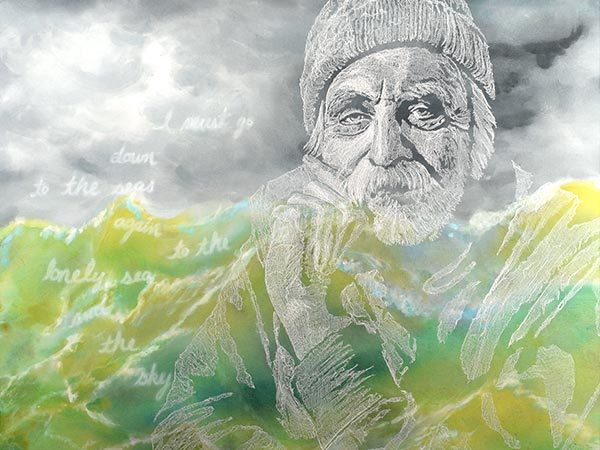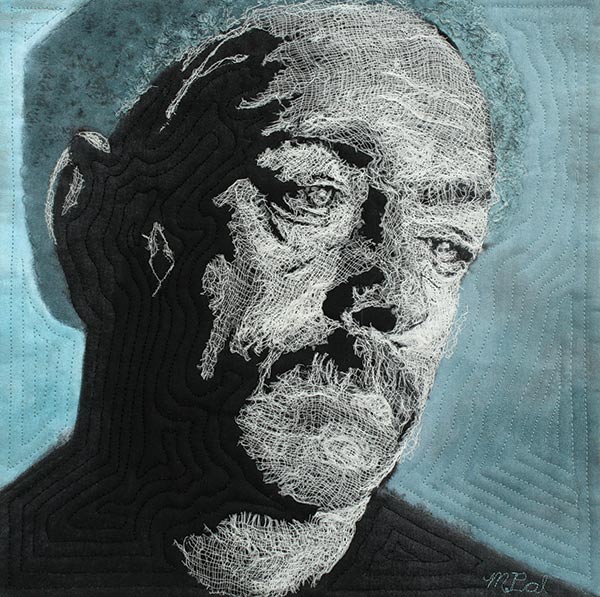Subtotal: $
Checkout-

Icon and Mirror
-

Dirty Work
-

Oh, to Weld!
-

Insights on Work
-

Carl Sandburg’s “Buffalo Dusk”
-

To-Do List
-

Mercenaries out of the Gate
-

Loneliness at College
-

An Economy for Anything
-

The Artist of Memory
-

Poetry and Prophecy, Dust and Ashes
-

Valor
-

Editors Picks Issue 22
-

Carl Sandburg
-

Covering the Cover: Vocation
-

The Noonday Demon
-

Captivated by the First Church
-

Sometimes I Wince at the Weight of your Hand
-

Why We Work
-

Readers Respond: Issue 22
-

Buccaneer School
-

The Unchosen Calling
-

A Life beyond Self
-

Insights on Vocation
-

Monks and Martyrs
-

A Love Stronger than Fear

What business does a man have in a hospital room – in the brief moment at the end of a long life lived everywhere and with everyone else – holding a hand and loving every year of a life he knows nothing about? There have been so many rooms that when I imagine the fifth floor of Calvary Hospital each nameplate at each doorjamb rapidly morphs into the next. There is only one constant: a janitor in a green jumpsuit waxing the linoleum floor. He waxes widely, slowly, left to right then reverse, Eddie Vedder growling through his headphones.
These names, changing and changing, persist somehow within me unchanged. These faces find me. They surprise me, coming into focus without me even closing my eyes – staring out a car window into a leafless wood or at a clean slice of blueberry pie or at the Host. I have awoken at night with a name and a prayer on my lips – “pray for us now and at the hour of our death” – often wondering if, at this moment, the petition might be redundant. What joins a man to another he’s known for so few hours at a time? Could it have something to do with that thoughtless-heartless monster, Cancer, pulverizing any hapless cell underskin? Alexander. Rose. Madelyn.

Mary Pal, Waiting, cheesecloth and acrylic on linen, 2008
Intimacy is not just for familiars at home. Death, at certain of her portals, can be intensely intimate.
Are you there? I catch myself wondering of a leaking, breathing corpus laid out on a hospital bed, eyes open and vacant. Life has its way of deceiving us. Sometimes the soul feels so loosely attached to a body, like a tooth you could tie a string around and – slam! – dislodge. Other times the soul feels so securely lodged in a patient that you expect heaven itself to descend and lift them both together behind its jeweled walls, into its duskless day. In either case it is the body, I like to think, that is steeped in soul, and it is Death who deceives if one thinks we can be finally ripped asunder.
It’s strange, too, to insert yourself into a relationship – of spouses, say – at its most tender and delicate apex. “Married fifty-five years,” a man said to me while looking over my shoulder – the way you might catch a new dad gaze longingly upon an incubated premie – at his wife. Every day at three he prayed the rosary from an upholstered chair at her bedside. The last time I saw her was early one afternoon. She woke from sleep to find me praying a chaplet. Too weak to talk, too gracious not to smile with just the wrinkles around her eyes. Loraine.
It’s not that they haunt me, these names and faces; the word is too strong and with the wrong connotations. But the names don’t go away, like leaves on the scrim of a rapid are submerged by the turmoil of currents, only to reemerge in a different bend of the river at a different hour.
Pastoring souls through the valley of death is a work one carries out long after a corpse is bagged, downed through the elevator shaft, and later downed more deeply into the earth, since, as we all seem to expect, a life goes on living this day and every day. Another name appears beside the door, but the flock doesn’t diminish. Each remains at the pastor’s side through the shadowed valley. They have become his own. Some you meet as “Kathleen,” for example. But the prayers you offer in memoriam are for an Aunt Kath.
I was not prepared for the affection of families.
I was not prepared for the silent communion one has with the incommunicative. The presence of another, as silent and unresponsive as it may be, is unique, always unrepeatable and mournable. I was not prepared for the angry: the woman whose skin lagged off her bones and whose voice came like a foghorn (“No! Arrrggg!!”) whenever she saw me. I am ashamed to say I never learned her name.

Mary Pal, Lighthouse Keeper, cheesecloth on canvas, 2018
I was not prepared for the agony. When I saw Deborah, she was in teeth-grinding torture. Each visit I found her sidelong, her fists clenched around the bars of the hospital bed, terror being worked out in her eyes. I would give her the Eucharist. She chewed Him, I thought at first, like one taking revenge, as if she could mortally masticate the living God.
As I knelt at her side and watched her commune, I saw her eyes, wide and looking around, still working out that terror, and saw that her heart was not on vengeance. I was looking upon something I couldn’t understand – like a child who walks in on adults reconciling.
I never felt very priestly at Calvary. The sacrifices were always offered by others, the sheep already in the teeth of wolves. Nor did God need me to make his visits. Marta: “Listen. I want to tell you something. I think God visited me. I woke up at night and he was there.”
“How did you know he was there?”
“He was running his fingers through my hair. It’s going to be OK, he said. That’s just what he said. It’s going to be OK.”
“And do you believe him?”
She looked very serious when she replied, “Yes. I do.” Then added, “I wanted to tell you because no one else would believe me. They would say it’s the drugs or my sickness or that I’m getting old, losing my mind.”
The first time I met Marta, she received a phone call from her sister just after I placed the Host in her mouth. She answered the phone and, in aggravated argument, managed to utter a couple expletives before swallowing. That was weeks earlier. The last time I ever saw her, she slept – cradled in the morphine drip, matted hair, thin as a rail – for the entire rosary I prayed from the armchair.
It impressed me how she received the word God spoke at her bedside. It’s going to be OK wasn’t negated by her imminent death. In her mind, there was no contradiction between word and event. The two were of a piece, sacramental. “He was running his fingers through my hair,” she had said. The prophet Ezekiel records that the Lord “will rescue [his sheep] from all places where they have been scattered on a day of clouds and thick darkness.” I wonder sometimes if that day of clouds and thick darkness might describe, not the day of scattering, but the day in which the sheep are finally rescued.

Mary Pal, Looking Back, cheesecloth on buckram, 2013
People die. That has been for me the least welcome aspect of this assignment. It’s the kind of thing you foreknow, but foreknowledge is different than experiential knowledge. The former is abstracted. The latter, visceral.
Maggie lay in a persistent vegetative state. As I read to her the fourteenth chapter of John’s Gospel, I found myself absorbed in her presence. The way a child absorbs himself in a brook which he looks upon from its grassy banks for the moveless movement of minnows. In the clean water, he might see them translucent and swimming still; he might see them, if he’s patient, spurt upcreek like light.
There is a lot to life that we don’t see, won’t touch, until it touches us and pulls us into its depths. After greeting Guillermo, apparently incommunicative – a touch on the shoulder, a word spoken from my knees to his upward-staring face – I visited with his daughter and granddaughter. We all prayed together. Then, after taking Guillermo’s hand to say goodbye, I was jolted by his stonemason grip and a groan which bore into me his deep gratitude.

Sign up for the Plough Weekly email
Already a subscriber? Sign in
Try 3 months of unlimited access. Start your FREE TRIAL today. Cancel anytime.





































Ann Dayton
Beautiful reflections of one who accompanies those on their final journey. Although now aged 81, I have never actually witnessed the final moments of any one - apart from one of my dogs, who died a natural death at home. Witnessing his final breath was a profound experience for me - never have I felt God to be so close as during his last moments.
Dan T
A beauty-filled piece of writing that somehow takes me to past days of grief, clarifies my path forward, and helps me enter into my present day tasks with greater purpose.